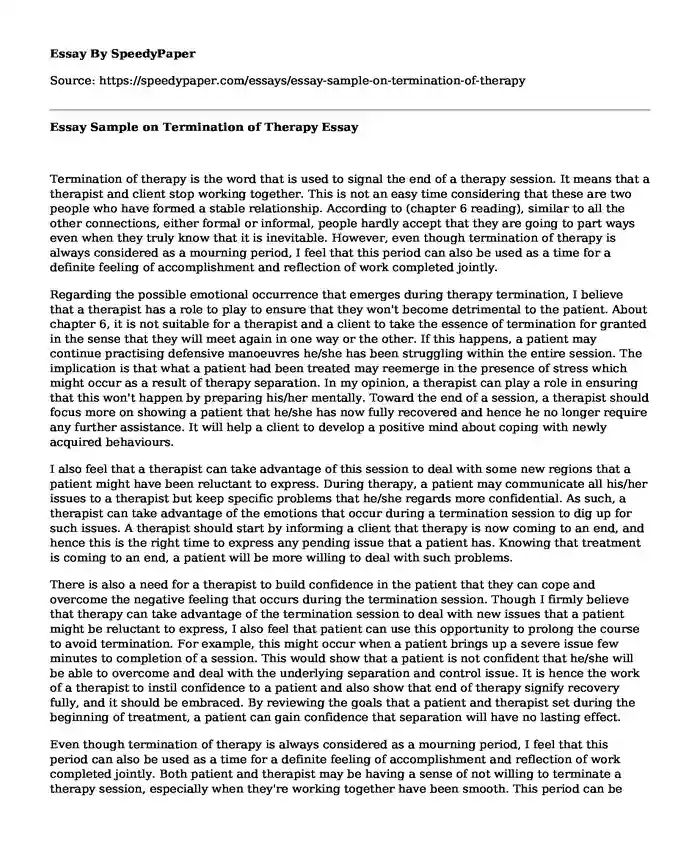
| Type of paper: | Essay |
| Categories: | Counseling |
| Pages: | 3 |
| Wordcount: | 735 words |
Termination of therapy is the word that is used to signal the end of a therapy session. It means that a therapist and client stop working together. This is not an easy time considering that these are two people who have formed a stable relationship. According to (chapter 6 reading), similar to all the other connections, either formal or informal, people hardly accept that they are going to part ways even when they truly know that it is inevitable. However, even though termination of therapy is always considered as a mourning period, I feel that this period can also be used as a time for a definite feeling of accomplishment and reflection of work completed jointly.
Regarding the possible emotional occurrence that emerges during therapy termination, I believe that a therapist has a role to play to ensure that they won't become detrimental to the patient. About chapter 6, it is not suitable for a therapist and a client to take the essence of termination for granted in the sense that they will meet again in one way or the other. If this happens, a patient may continue practising defensive manoeuvres he/she has been struggling within the entire session. The implication is that what a patient had been treated may reemerge in the presence of stress which might occur as a result of therapy separation. In my opinion, a therapist can play a role in ensuring that this won't happen by preparing his/her mentally. Toward the end of a session, a therapist should focus more on showing a patient that he/she has now fully recovered and hence he no longer require any further assistance. It will help a client to develop a positive mind about coping with newly acquired behaviours.
I also feel that a therapist can take advantage of this session to deal with some new regions that a patient might have been reluctant to express. During therapy, a patient may communicate all his/her issues to a therapist but keep specific problems that he/she regards more confidential. As such, a therapist can take advantage of the emotions that occur during a termination session to dig up for such issues. A therapist should start by informing a client that therapy is now coming to an end, and hence this is the right time to express any pending issue that a patient has. Knowing that treatment is coming to an end, a patient will be more willing to deal with such problems.
There is also a need for a therapist to build confidence in the patient that they can cope and overcome the negative feeling that occurs during the termination session. Though I firmly believe that therapy can take advantage of the termination session to deal with new issues that a patient might be reluctant to express, I also feel that patient can use this opportunity to prolong the course to avoid termination. For example, this might occur when a patient brings up a severe issue few minutes to completion of a session. This would show that a patient is not confident that he/she will be able to overcome and deal with the underlying separation and control issue. It is hence the work of a therapist to instil confidence to a patient and also show that end of therapy signify recovery fully, and it should be embraced. By reviewing the goals that a patient and therapist set during the beginning of treatment, a patient can gain confidence that separation will have no lasting effect.
Even though termination of therapy is always considered as a mourning period, I feel that this period can also be used as a time for a definite feeling of accomplishment and reflection of work completed jointly. Both patient and therapist may be having a sense of not willing to terminate a therapy session, especially when they're working together have been smooth. This period can be used as a reflection of work accomplished. A therapist can take advantage of this time to dig for some possible new issue that a patient has been reluctant to bring out. However, ensuring that a patient does not use this opportunity to prolong therapy to avoid termination. The main thing is for a therapist to take control to prevent hanging separation and to instil confidence to the patient that he/she is now fully recovered and can cope with his new behaviours independently.
Cite this page
Essay Sample on Termination of Therapy. (2023, Apr 01). Retrieved from https://speedypaper.net/essays/essay-sample-on-termination-of-therapy
Request Removal
If you are the original author of this essay and no longer wish to have it published on the SpeedyPaper website, please click below to request its removal:
- American Foreign Policy Essay Sample
- Book Review: The Signal in the Noise - Literary Essay Sample
- Free Essay on the Death of the Supreme Court Associate
- Project Charter Essay Sample
- Free Essay Sample on Marketing in Pet Industry
- Paper Example on Rebuilding a Nation After the Haiti Earthquake Disaster
- Free Essay Example - Depression Guidelines
Popular categories




